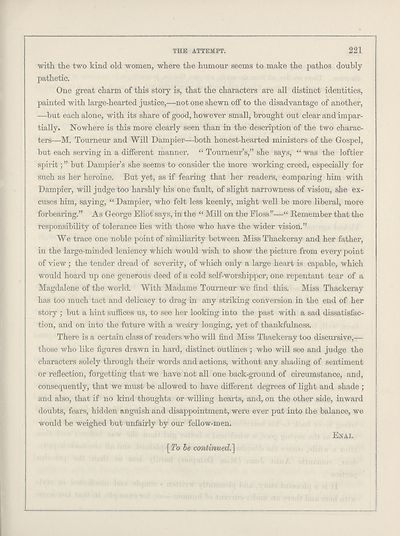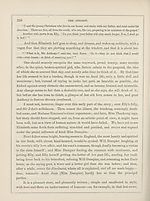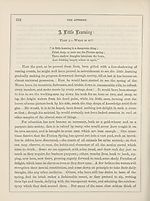Download files
Complete book:
Individual page:
Thumbnail gallery: Grid view | List view

THE ATTEMPT. 221
with the two kind old women, where the humour seems to make the 2)atlios doubly
pathetic.
One great charm of this story is, that the characters are all distinct identities,
painted with large-hearted justice,—not one shewn off to the disadvantage of another,
—but each alone, with its share of good, however small, brought out clear and impar¬
tially. Nowhere is this more clearly seen than in the description of the two charac¬
ters—M. Tourneui- and Will Dampier—both honest-hearted ministers of the Gospel,
but each serving in a different manner. " Tourneur's," she says, " was the loftier
spirit;" but Dampier's she seems to consider the more working creed, especially for
such as her heroine. But yet, as if fearing that her readers, comparing him with
Dampier, will judge too harshly his one fault, of slight narrowness of vision, she ex¬
cuses him, saying, " Dampier, who felt less keenly, might well be more liberal, more
forbearing." As George Eliot says, in the " Mill on the Floss"—" Remember that the
responsibility of tolerance lies with those who have the wider vision."
We trace one noble point of similiarity between Miss Thackeray and her father,
in the large-minded leniency which would wish to show the picture from every point
of view; the tender dread of severity, of which only a large heart is capable, which
would hoard up one generous deed of a cold self-worshipper, one repentant tear of a
Magdalene of the world. With Madame Tourneur we find this. Miss Thackeray
has too much tact and delicacy to drag in any striking conversion in the end of her
story ; but a hint suffices us, to see her looking into the past with a sad dissatisfac¬
tion, and on into the future with a weary longing, yet of thankfulness.
There is a certain class of readers who will find Miss Thackeray too discursive,—
those who like figures drawn in hard, distinct outlines ; who will see and judge the
cliaracters solely through their words and actions, without any shading of sentiment
or reflection, forgetting that we have not all one back-ground of circumstance, and,
consequently, that we must be allowed to have different degrees of light and shade ;
and also, that if no kind thoughts or willing hearts, and, on the other side, inward
doubts, fears, hidden anguish and disappointment, were ever put into the balance, we
would be weighed but unfairly by our fellow-men.
Enai.
[To be continued.]
with the two kind old women, where the humour seems to make the 2)atlios doubly
pathetic.
One great charm of this story is, that the characters are all distinct identities,
painted with large-hearted justice,—not one shewn off to the disadvantage of another,
—but each alone, with its share of good, however small, brought out clear and impar¬
tially. Nowhere is this more clearly seen than in the description of the two charac¬
ters—M. Tourneui- and Will Dampier—both honest-hearted ministers of the Gospel,
but each serving in a different manner. " Tourneur's," she says, " was the loftier
spirit;" but Dampier's she seems to consider the more working creed, especially for
such as her heroine. But yet, as if fearing that her readers, comparing him with
Dampier, will judge too harshly his one fault, of slight narrowness of vision, she ex¬
cuses him, saying, " Dampier, who felt less keenly, might well be more liberal, more
forbearing." As George Eliot says, in the " Mill on the Floss"—" Remember that the
responsibility of tolerance lies with those who have the wider vision."
We trace one noble point of similiarity between Miss Thackeray and her father,
in the large-minded leniency which would wish to show the picture from every point
of view; the tender dread of severity, of which only a large heart is capable, which
would hoard up one generous deed of a cold self-worshipper, one repentant tear of a
Magdalene of the world. With Madame Tourneur we find this. Miss Thackeray
has too much tact and delicacy to drag in any striking conversion in the end of her
story ; but a hint suffices us, to see her looking into the past with a sad dissatisfac¬
tion, and on into the future with a weary longing, yet of thankfulness.
There is a certain class of readers who will find Miss Thackeray too discursive,—
those who like figures drawn in hard, distinct outlines ; who will see and judge the
cliaracters solely through their words and actions, without any shading of sentiment
or reflection, forgetting that we have not all one back-ground of circumstance, and,
consequently, that we must be allowed to have different degrees of light and shade ;
and also, that if no kind thoughts or willing hearts, and, on the other side, inward
doubts, fears, hidden anguish and disappointment, were ever put into the balance, we
would be weighed but unfairly by our fellow-men.
Enai.
[To be continued.]
Set display mode to: Large image | Transcription
Images and transcriptions on this page, including medium image downloads, may be used under the Creative Commons Attribution 4.0 International Licence unless otherwise stated. ![]()
| Ladies' Edinburgh Debating Society publications > Attempt > Volume 3 > (235) Page 221 |
|---|
| Permanent URL | https://digital.nls.uk/104346052 |
|---|
| Attribution and copyright: |
|
|---|

